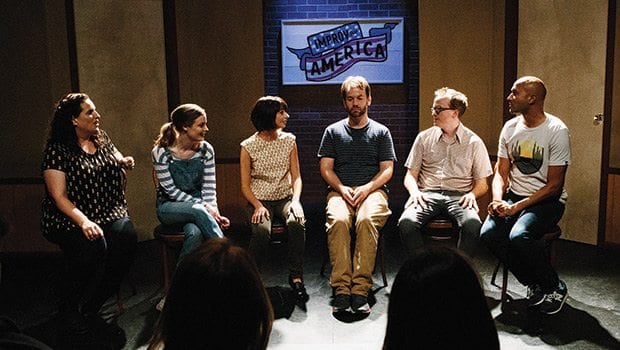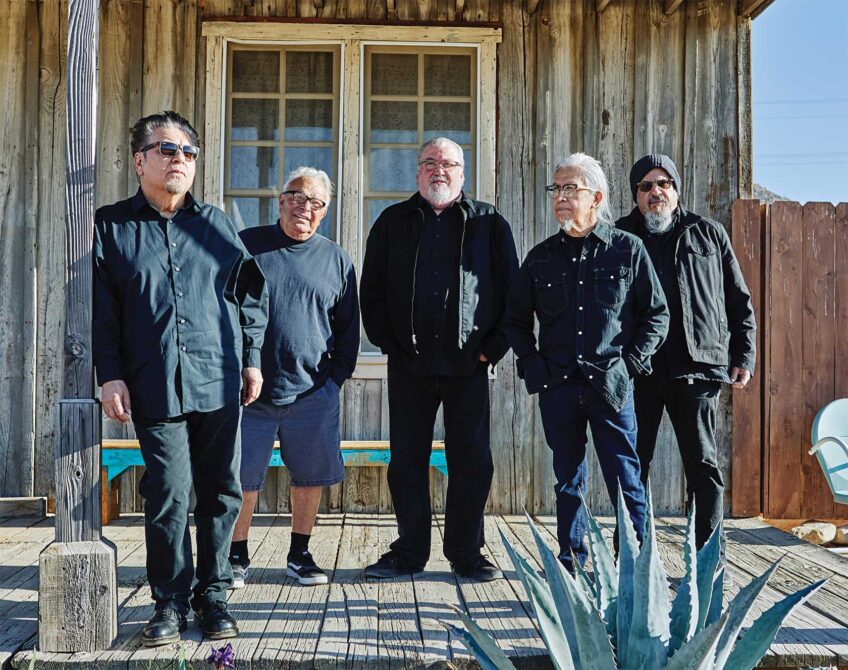
Set in New York City, “Don’t Think Twice” is a warm, funny, engaging and insightful look into the lives of six improv performers — Jack (Keegan-Michael Key of “Key & Peele”), Sam (Gillian Jacobs from HBO’s “Girls”), Allison (Kate Micucci of the comedy duo Garfunkel and Oates); Lindsay (Tami Sagher, writer/producer on “Inside Amy Schumer”); Bill (Chris Gethard, host and star of Fusion’s “The Chris Gethard Show”); and Miles (Mike Birbiglia, “Trainwreck” and “Orange is the New Black”) — who after 11 years of hitting the stage together nightly in hopes of making it big, are faced with the realization that not all of them will be able to make their dreams come true.
Opening at the Kendall Square Cinema on Friday, the film is written and directed by stand-up comedian and actor Mike Birbiglia, who in 2012 won the “Best of Next” Audience Award at the Sundance Film Festival for his directorial debut, “Sleepwalk With Me,” based on his book and one-man show of the same name.
Earlier this summer, Birbiglia and Gethard sat down with the Banner and talked about working together and defining success on their own terms.
At the screening, one guy to my left was laughing throughout the film, and a woman to my right was laughing but she was also very emotional during some of the scenes. How do you want audiences to react when they see the film?
Mike Birbiglia: The reason I got into movies was I love films from the ’70s and ’80s like “Terms of Endearment,” “Broadcast News,” “Hannah and Her Sisters,” “The Big Chill.” I love movies where you laugh, you cry. It’s awkward, it’s painful. It’s funny. It feels like life. That was my prompt to all these guys. Let’s make this feel like a documentary. If someone watches it in France with subtitles they think it’s real.
How did working together through stand-up and touring come into play for this movie?
Chris Gethard: I think one of the things about Mike that’s really so inspiring and remarkable from the outside is that he’s just got this relentless drive to say stuff. There’s ways in which, with his stand-up and his one-man show that I toured with, you see that one container for what he had to say; and for the movie was a totally different container. One of the aspects of that that was really valuable was that as a director, I think we as actors were all able to trust that Mike really had our backs as creative people, as performers first, because he’s in the trenches. He’s directing the movie, and then on the weekends he’s getting up on stage himself. It’s a movie about artists. It makes it very easy to trust the director’s intentions towards saying things about artists when you know he is one — right next to you. Knowing that Mike has shared the stage with me and Tammy, and to varying degrees all the members of the cast have seen him in action and shared that artist experience with him, makes it very easy to trust him, and know that we don’t need to watch our own backs, he’s got us.
Mike, this is your second film. What have you learned from your first film, “Sleepwalk With Me” to this one?
MB: I don’t know if you can write it in the Bay State Banner, but no a-holes. [Laughs] No jerks, no a-holes. My biggest takeaway from the first one is you really have to interview people, check references and ask at least three people who they worked with. There’s really no time for jerks on the set. We had no jerks in the crew; none on the cast. I would always say in the first meeting, ‘Congratulations, you’re not an asshole and if you start acting like one we’re all going to be confused, and you probably won’t work on the movie much longer.’ That was one thing; and the other thing was shoot way more than you need. Shoot early, shoot long. Get a lot of footage because you need so much in the edit room. Get good sound. That’s what Michael Moore always says. Sound is more important than picture.
I read on vulture.com, Chris, that you talked about a lot of comics leaving New York to move out to LA. In the article you talked about being motivated by happiness and why you’ve chosen to remain in New York. That seems to kind of relate to Sam’s character in the film. Was that sentiment used for Sam’s character or was it more organic in the way it came together?
CG: I think it’s an experience that we all have, artists or otherwise. We spend so much time thinking about achievement, thinking about status, thinking about how we compare to the person next desk down or the person in the house next door, what kind of car are they driving, what kind of byline are they getting, what kind of part they’re booking. I think for all of us it’s just the thing that we have to kind of unwrap at some point and realize that achievements might make you happy and that’s great if they do, and some do along the way, but there’s other more basic versions of happiness that aren’t contingent upon your ego or patting yourself on your back, or having people patting you on your back, or having people validate you from the outside. There’s just some basic humanity that we forgo in the pursuit of validation and I think Sam’s character is a big example of that, and I think real life has taught me that many times. I think the fact that that’s something I felt so real in life that’s shown up in some of my writing, I think, is proof that I don’t think Mike was dressing anything up too much, or hiding too much in the real world. I think he is really good at putting experiences that we all feel on screen.
MB: That’s one of the reasons we’re doing these workshops, places like Improv Boston. Phoenix, Boston, San Francisco, and Seattle, places we’re doing these workshops — 30 workshops, 30 cities — you have the ability on any given night to make the greatest improv show, the most topical improv show, the best performing improv show in the world, and no one can take it away from you, and that’s success. If you perform for 30 people in Boston and it was really moving and it changes those people’s day from being a sad day to where they didn’t think they could laugh to laughing, that’s hell of a lot more powerful to me than being on a mediocre sitcom half-watched by seven million people.
How would you then define success for yourself, Mike?
MB: I haven’t found it yet. I’ll call you when I get there but I’m optimistic for my 40s. I just turned 38 and I feel like I’m going to hit my sweet spot at movie four or five. It’s a cliché, but I feel successful because I think I’m a decent husband and father to a 13-month child. And I’m able to make things outside of the system of Hollywood that, thanks to my fans, I might be able to make more of — and to me that is success.






